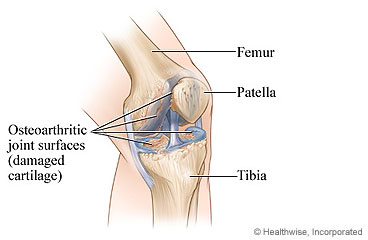Knee Arthritis: Care Instructions
Overview

Knee arthritis is a breakdown of the cartilage that cushions your knee joint. When the cartilage wears down,
your bones rub against each other. This causes pain and stiffness. Knee arthritis tends to get worse with
time.
Treatment for knee arthritis involves reducing pain, making the leg muscles stronger, and staying at a
healthy body weight. The treatment usually does not improve the health of the cartilage, but it can reduce
pain and improve how well your knee works.
You can take simple measures to protect your knee joints, ease your pain, and help you stay active.
Follow-up care is a key part of your treatment and safety. Be sure to make and go to all
appointments, and call your doctor if you are having problems. It's also a good idea to know your test results
and keep a list of the medicines you take.
How can you care for yourself at home?
-
Know that knee arthritis will cause more pain on some days than on others.
-
Stay at a healthy weight. Lose weight if you are overweight. When you stand up, the pressure on your knees
from every pound of body weight is multiplied four times. So if you lose 10 pounds, you will reduce the
pressure on your knees by 40 pounds.
-
Talk to your doctor or physical therapist about exercises that will help ease joint pain.
-
Stretch to help prevent stiffness and to prevent injury before you exercise. You may enjoy gentle
forms of yoga to help keep your knee joints and muscles flexible.
-
Walk instead of jog.
-
Ride a bike. This makes your thigh muscles stronger and takes pressure off your knee.
-
Wear well-fitting and comfortable shoes.
-
Exercise in chest-deep water. This can help you exercise longer with less pain.
-
Avoid exercises that include squatting or kneeling. They can put a lot of strain on your knees.
-
Talk to your doctor to make sure that the exercise you do is not making the arthritis worse.
-
Do not sit for long periods of time. Try to walk once in a while to keep your knee from getting stiff.
-
Ask your doctor or physical therapist whether shoe inserts may reduce your arthritis pain.
-
If you can afford it, get new athletic shoes at least every year. This can help reduce the strain on your
knees.
-
Use a device to help you do everyday activities.
-
A cane or walking stick can help you keep your balance when you walk. Hold the cane or walking stick
in the hand opposite the painful knee.
-
If you feel like you may fall when you walk, try using crutches or a front-wheeled walker. These can
prevent falls that could cause more damage to your knee.
-
A knee brace may help keep your knee stable and prevent pain.
-
You also can use other things to make life easier, such as a higher toilet seat and handrails in the
bathtub or shower.
-
Take pain medicines exactly as directed.
-
Do not wait until you are in severe pain. You will get better results if you take it sooner.
-
If you are not taking a prescription pain medicine, take an over-the-counter medicine such as
acetaminophen (Tylenol), ibuprofen (Advil, Motrin), or naproxen (Aleve). Read and follow all
instructions on the label.
-
Do not take two or more pain medicines at the same time unless the doctor told you to. Many pain
medicines have acetaminophen, which is Tylenol. Too much acetaminophen (Tylenol) can be harmful.
-
Tell your doctor if you take a blood thinner, have diabetes, or have allergies to shellfish.
-
Ask your doctor if you might benefit from a shot of steroid medicine into your knee. This may provide pain
relief for several months.
-
Many people take the supplements glucosamine and chondroitin for osteoarthritis. Some people feel they
help, but the medical research does not show that they work. Talk to your doctor before you take these
supplements.
When should you call for help?
 Call your
doctor now or seek immediate medical care if:
Call your
doctor now or seek immediate medical care if:
Watch closely for changes in your health, and be sure to contact your doctor if you have
any problems.
Current as of: July 17, 2023
Content Version: 14.0
Care instructions adapted under license by your
healthcare professional. If you have questions about a medical condition or this instruction, always ask
your healthcare professional. Healthwise, Incorporated disclaims any warranty or liability for your use of
this information.